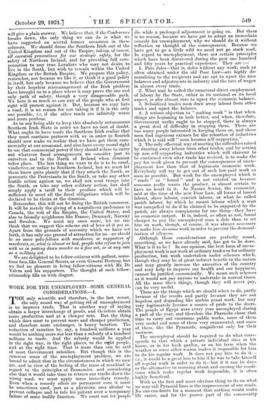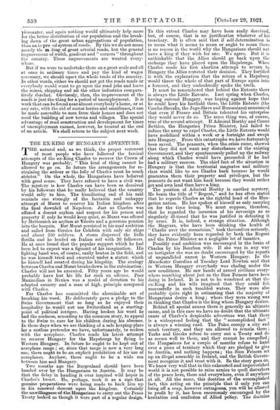WORK FOR THE UNEMPLOYED—SOME GENERAL CONSIDERATIONS.—I. T HE only scientific and
therefore, in the last resort, the only sound way of getting rid of unemployment is to improve trade. That is another way of saying obtain a larger interchange of goods, and therefore obtain more production and at a cheaper rate. But the thing which does most to prevent more and cheaper production, and therefore more exchanges, is heavy taxation. The reduction of taxation by, say, a hundred millions a year would be nothing more nor less than a subsidy of a hundred millions to trade. And the subsidy would be applied in the right way, in the right places, to the right people, and at the right time. That is more than can be said of most Government subSidies. But though this is the common sense of the unemployment problem, we are bound to admit that in the circumstances in which we now are, and in view of the feeling of the mass of mankind in regard to the principles of Economics, and considering also that it would take time to retrace our tracks down the wrong road, we must apply some immediate remedy. Even when a remedy offers no permanent cure it must be sometimes used, just as a physician uses alcohol to prevent collapse and to tide his patient over a temporary failure of some bodily function. We must not let people die while a prolonged adjustment is going on. But there is no reason, because we have got to adopt an immediate remedy for unemployment, why we should do it without reflection or thought of the consequences. Because we have got to go a little wild we need not go stark mad. In regard to unemployment, there are certain principles which have been discovered during the past one hundred and fifty years by practical experience. They are :- 1. Pure doles—that is, doles without any work, such as often obtained under the old Poor Law—are highly de- moralizing to the recipients and are apt to upset the nice balances and adjustments in industry and the rate of wages in almost every trade. 2. What may be called the unnatural direct employment of labour by the State, either in its national or its local aspect, is also almost sure to upset the economic balance. 3. Subsidized trades soon draw away labour from other trades and upset the balance. 4. A serious objection to " making work " is that when things are beginning to look better, and when, therefore, Government works ought to be stopped, there is always a great deal of difficulty in stopping them. There are too many people interested in keeping them on, and these soon find ingenious excuses for the retention of industries which it is said will " soon become self-supporting." 5. The only effectual way of meeting the difficulties raised by drawing away labour from other trades, and by setting up non-self-supporting industries which will clamour to be continued even after trade has revived, is to make the pay for work given to prevent the consequences of unem- ployment less than that of legitimate economic work. Everybody will try to get out of such low-paid work as soon as possible. But work for the unemployed which is " made " or found " and is not entered on because someone really wants the product, is almost certain to have no heart in it. As Nassau Senior, the economist, said at the time of the new Poor Law, all forms of forced labour, slave labour, convict labour, or what he called parish labour, by which he meant labour which a man was compelled to do if he claimed to be supported by the parish, arc always conspicuous for one thing—they have no economic output. It is, indeed, as often as not, found cheaper to pay the unemployed man a dole than to set him on work, though, of course, it was always necessary to make him do some work in order to prevent the demoral- ization of idleness.
Although these considerations are perfectly sound, something, as we have already said, has got to be done. What is it to be ? In our opinion, the best form of unem- ployment work is not work at ordinary trades or for ordinary production, but work undertaken under schemes which, though they may be of great indirect benefit to the nation and may greatly increase the amenities of the country and may help to improve our health and our happiness, cannot be justified economically. We mean such schemes as it would not pay anyone to undertake in normal times. All the same these things, though they will never pay, can be very useful. These arc the things which we should select to do, partly because of the results and partly because they are not hopeless and degrading like useless penal work, but may very legitimately become a source of pride to the doers. The people of Egypt were every year unemployed during a part of the year, and therefore the Pharaohs chose that time to carry out enormous public works, some of them very useful and sonic of them very ornamental, and some of them, like the Pyramids, magnificent only for their vastness.
The unemployed should be required to do what corre- sponds to that which a private individual does in his house, or in his back garden, or on his farm when the weather or some other reason makes it impossible for him to do his regular work. It does not pay him to do it- i.e., it would be a great loss to him if he was to take himself off regular work in order to do it—but if it can be done as the alternative to mooning about and cursing the condi- tions which make regular work impossible, it is often highly beneficial.
With us the first and most obvious thing to do on what we may call Pyramid lines is the improvement of our roads. No one can doubt for a moment that nothing would make life easier, and for the poorer part of the community pleasanter, and again nothing would ultimately help more for the better distribution of our population and the break- ing down of the great urban aggregations of population, than an inpro red system of roads. By this we do not mean merely the in king of great arterial roads, but the general improvement of width, gradient and " corners " throughout the country. These improvements are wanted every- where.
But if we were to undertake them on a great scale and all at once in ordinary times and pay the kind of wages necessary, we should upset the whole trade of the country. In other words, either we should not get the roads made or everybody would want to go upon the road jobs and leave the mines, shipping and all the other industries compara- tively derelict. Obviously, then, the improvement of the roads is just the thing for a period of unemployment. It is work that can be found near almost everybody's home, or at any rate, with the aid of motor lorries and omnibuses, it can be made accessible to men from their homes and does not need the building of new towns and villages. The special advantage of road construction and development for times of unemployment cannot, however, be treated at the end of an article. We shall return to the subject next week.







































 Previous page
Previous page